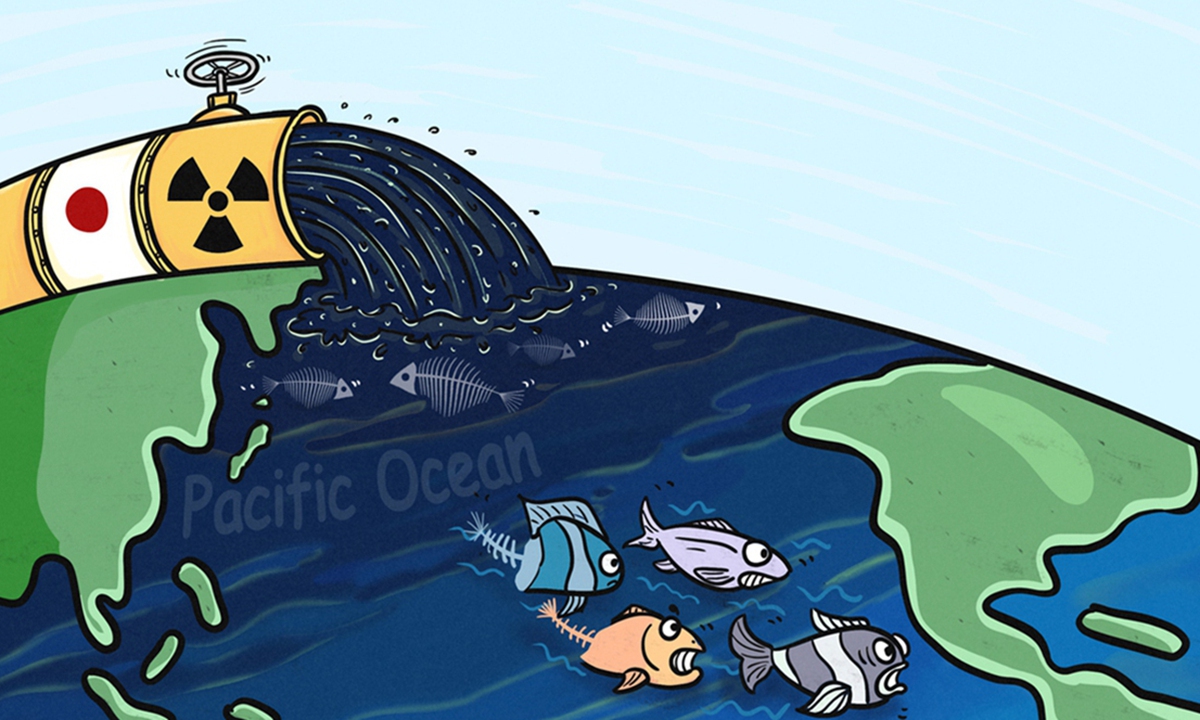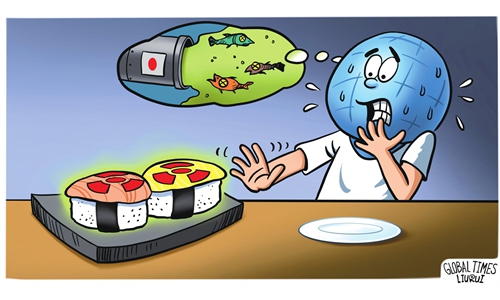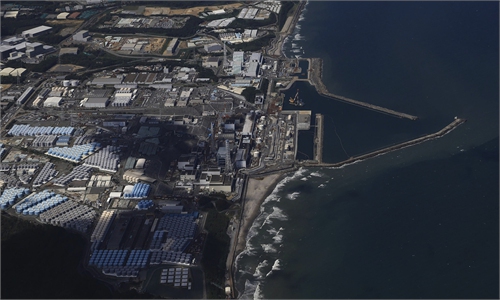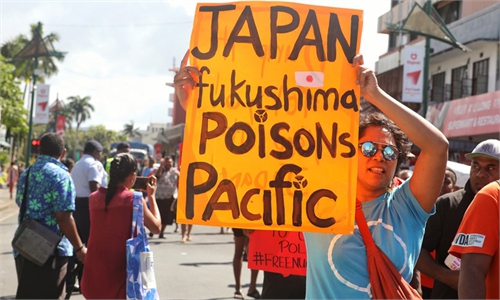
Illustration: Chen Xia/GT
People in Asia-Pacific and other regions are frustrated and outraged, voicing growing alarms and concerns about Japan's selfish and categorically irresponsible dumping of Fukushima nuclear contaminated wastewater into the Pacific Ocean, which started on August 24.By all metrics, Japan is playing with fire, imperiling the world's oceans and all marine life while at the same time endangering an indispensable living environment of future generations of humanity. All residents on this globe are duty bound to continue to ratchet up opposition to Japan till Tokyo stops wastewater discharge.
Japanese Prime Minister Fumio Kishida, by announcing that Japan has started releasing the nuclear-contaminated water from the broken Fukushima Daiichi Nuclear Power Plant into the ocean, has showed neither he nor his administration cares a hoot about the marine ecology and the severe hazard to human health.
It is striking that Kishida made the announcement two days after his returning from his meeting with the US and South Korean presidents at Camp David, Maryland, as if he got the go-ahead for the wastewater dumping. No wonder many South Koreans have flooded streets to display their displeasure and opposition these days.
The International Atomic Energy Agency (IAEA) has promised that its staff would continue to monitor and assess the activities on site to ensure that they continue to be consistent with the safety standards. But there exists a major public concern -- in the event that the process begins and subsequently causes damage to the marine environment, will the IAEA be able to assist Japan in remedying the situation and reclaiming the contaminated nuclear water?
And, there is another important point to make. Though the IAEA's review report, issued on July 4, noted that the dump's impact on marine environment and human health would be negligible, the assessment was actually done on the data provided solely by Tokyo, which is not professional and highly dubious, because the authenticity of the Japanese data is not reliable. Also, the review report admitted that the so-called Advanced Liquid Processing System used by Tokyo, cannot remove tritium, among their radioactive isotopes, from the wastewater.
Scientific studies show the system is ineffective in removing tritium and carbon-14 and other radioactive isotopes, which can pass through the food chain to other organisms and eventually to human beings. Therefore, the long-term harmful effects of the radioactive nuclear water that Japan dumps into the ocean over the coming 30 years are highly unpredictable - indicating that Japan should not take the IAEA report as a permit or official clearance to dump the nuclear wastewater.
The IAEA report, for all practical purposes, is a review, not an authorization for the dumping of the radioactive water into the Pacific or legal approval of Japan's wastewater discharge. Rafael Mariano Grossi, director general of the IAEA, said: "The release of the treated water stored at Fukushima Daiichi Power Station is a national decision by the Government of Japan, and that this report is neither a recommendation nor an endorsement of that policy (dumping)".
By assuming that the IAEA's review of Japan's plan to dump the radioactive water into the sea gives it the license to poison the oceans, Kishida is doing one of the greatest disservices to not only the seas and oceans but also all life on Earth.
Japan has a relatively comprehensive legal system for nuclear damage compensation, including four major legislative instruments: the Act on Compensation for Nuclear Damage, the Order for the Execution of the Act on Compensation for Nuclear Damage, the Act on Indemnity Agreement for Compensation of Nuclear Damage, and the Order for the Execution of the Act on Indemnity Agreement for Compensation of Nuclear Damage. And a number of principles of international third-party liability regimes are embodied in Japanese laws.
The Act on Compensation for Nuclear Damage defines ''nuclear damage'' as ''any damage caused by the effects of the fission process of nuclear fuel, or of the radiation from nuclear fuel etc., or of the toxic nature of such materials". So, nuclear plant operators in Japan including TEPCO are liable for the nuclear damage caused by ordinary natural disasters such as an earthquake or a volcanic eruption.
In Japanese law, the liability of nuclear plant operators is unlimited, but they can cover such losses through an indemnity agreement with the Japanese government. In practice, a series of group lawsuits have been filed for huge amounts of compensation in different prefectures of Japan by environmental refugees and victims of the nuclear pollution damage caused by the damaged Fukushima Daiichi Nuclear Power Plant.
According to international law, Japan should bear state responsibility for the discharge of the radioactive water into the ocean and the damage it causes as a subsequence. Therefore, coastal countries such as China, the Democratic People's Republic of Korea, South Korea, Russia, many other Asia-Pacific countries, and even Latin American countries that would suffer from the environmental damage and economic loss due to the nuclear pollution caused by the radioactive water dumping, can file lawsuits with the International Court of Justice, the International Tribunal for the Law of the Sea or international arbitration for pollution damage compensation against Japanese government.
Yes, Tokyo should be held liable for any damages one to the broad marine life the world over. The Japanese government should be made to bear responsibility for open seas pollution and the damages it causes to marine life and broad seas. Also, the UN Convention on the Law of the Sea, to which Japan is a signing party, rules that states have the obligation to protect the Earth's marine environment.
The author is an editor with the Global Times. bizopinion@globaltimes.com.cn



